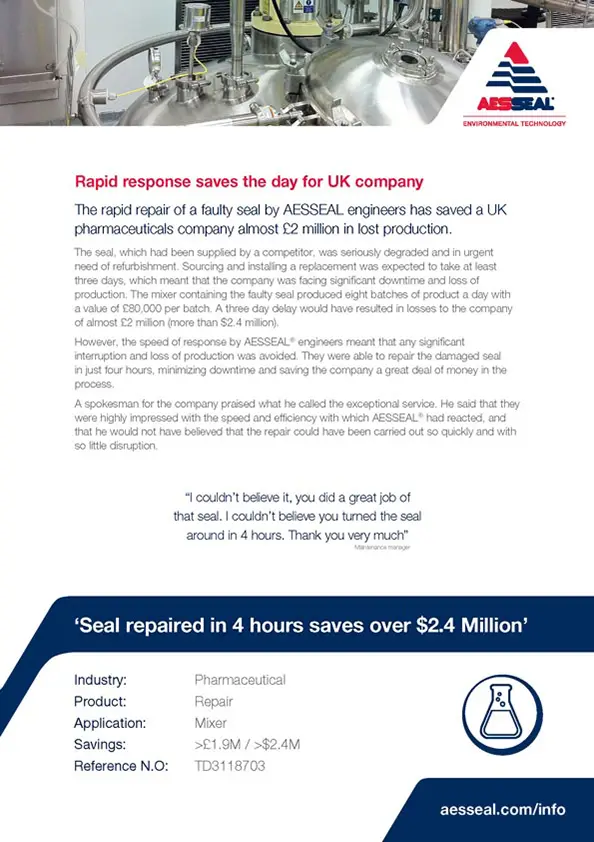
More Industry Related Content
With Oliver Crank
The rapid repair of a faulty seal by AESSEAL engineers saved a UK pharmaceuticals company almost $2 million in lost production. Our technical sales engineer Olly Crank explains how AESSEAL’s speed of response not only saved the company millions in lost production, but resulted in a lot of additional business.
What was the problem with the original seal?
It was a mechanical seal on a top entry mixer. It had been supplied by one of our competitors, and it failed as a result of a gearbox issue. The seal was vital in making sure that there was no product contamination from the atmosphere, so when it failed, it meant that the company couldn’t run the mixer.
How did AESSEAL end up getting the contract?
We make sure that we keep in close contact with potential customers, cultivating a good relationship so that when they have a problem, we are one of the first calls they make. I had already been talking to the customer over a period of several months, telling them all about our products and services, so when they were faced with this potentially very expensive problem, they gave me a call.
What did the refurbishment involve?
The seal was removed by the customer and we collected it and took it back to our repair centre. We refurbished what we could and supplied new components for any parts which we judged were beyond repair. The way it works is that the seals are booked in at the repair center, cleaned, stripped and assessed. We give the customer a quotation for the cost of the refurbishment, and once we receive a purchase order we’re ready to start work. Any reusable parts are cleaned and seal faces re-lapped. If any new parts are needed, we manufacture them. Springs, fixings and O-Rings are all changed as per standard procedure. Once the seal has been fully assembled it’s pressure tested. Our policy is that all mechanical seals leave our repair centre leave ‘as new’
How long did the repair actually take?
Not long at all. I think the actual repair was carried out in about four hours. We knew that this was a critical component and that production was at a halt until we could carry out the repair and get the seal back to them. So it was vital that we did that as soon as possible. The mixer produced eight batches of product a day with a value of $80,000 per batch, so a three day delay, which is what they were told to expect by the original supplier, would have resulted in losses to the company of almost $2 million. In the end, our rapid response time meant that production was halted for just nine hours.
What was the customer’s reaction?
They were amazed that we were able to carry out the repair so quickly. The result is that they decided to replace the original seals on their mixers with AESSEAL products, and we have since become the company’s preferred seal supplier. An added benefit was that word spread about our customer service and our speed of response, so now we have established a reputation as the first port of call for any companies facing similar problems.








